2017-2018 Students of ACS
5/14 Students of ACS
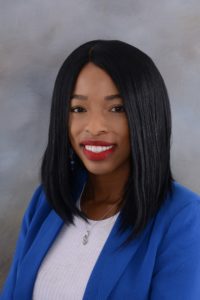
Jedidah Morrell, Northern Kentucky University Chase College of Law '18
I have always known I wanted to practice law because of my unique experience growing up in an unincorporated territory of the United States, as a daughter of immigrant parents. But, as I entered law school, I began to have serious doubts about the legal system I was about to join. Would I be able to stay true to my ultimate goals and have my actions reflect the principles that drew me into this field?
Last semester, two consecutive hurricanes devastated my hometown, St. Thomas, U.S. Virgin Islands. This caused a communications crisis – for an entire week, I had no idea whether my family made it out alive. I was finally able to share the news with my colleagues that my family was safe, despite losing everything materialistic. They asked how I was able to still show up to school daily. I retorted with the words of my favorite Caribbean humanitarian, Bob Marley: “The people who are trying to make this world worse aren’t taking days off. Why should I?”
I found my niche at law school through my involvement with ACS and internships with the ACLU of Puerto Rico, Kentucky Innocence Project, and Constitutional Litigation at the Ohio Justice and Policy Center, where I participated in transformative work. It was my work for others that kept me going through difficulties. In my role as Chase ACS Chapter President, I was able to turn my pain in power. We organized a food and clothing drive for the often overlooked Caribbean islands which were devastated by the hurricanes.
Although my post-grad job on St. Thomas was swept away with the hurricanes, my plan to devote my professional life to vindicating the human and civil rights of others has not wavered.
5/7 Students of ACS
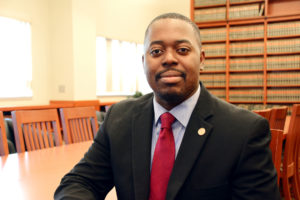
David Alcius, Florida A&M University College of Law '18
I believe that we will end up where we push ourselves and that where we end up is the result of our will. Often, when folks recount the history of this country, they speak with a air of inevitability that elides the fact that our present existence is not inevitable. As unpredictable as the future is to us today, our present state was just as unpredictable for those living just two generations before us. To bring about change, many individuals had to take it upon themselves to bring about this change. These individuals had to take it upon themselves to build a lasting legacy for future generations to honor as a testament to our shared values. Today, just like the days before it, is the result of the conscious decision-making of men and women who recognized where they stood in relation to history and destiny, for both the good and the bad.
The American Constitution Society understands where it stands in relation to history and destiny. If the arc of the moral universe is to bend towards justice, then it requires hands to bend it in that direction. We need hands to fix our criminal justice system and undo the damage wrought by mass incarceration, particularly in black and brown communities. We need hands to help provide all Americans meaningful access to affordable and decent healthcare without individuals having to decide between their health and their ordinary needs. We need hands to help close the wealth gap. We need hands. While these hands aren’t promised, they must be cultivated.
As the former president of the ACS student chapter at Florida A&M University College of Law, it has been a pleasure to work with folks within the chapter and across the country who are truly committed in providing a hand at moving the country forward and ushering it into a new era that many of us could not have predicted, much less imagined. We are constantly reminded about the importance of the courts and why voting matters. The world that is ours today is a byproduct of what happens in the courtroom and in the voting booth. ACS knows that in order to prepare for the uncertain future and push back against the attacks on our democratic institutions, it’ll need to continue cultivating the next generation of progressive leaders. I am proud to be a member of the American Constitution Society and look forward to being in the thick of the struggles to come, which, perhaps, is the only thing predictable about the future.
4/30 Students of ACS
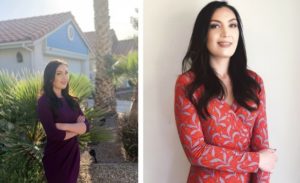
Racheal A. Ross, William S. Boyd School of Law '18
Viktor E. Frankl wrote in Man's Search for Meaning, "success, like happiness, cannot be pursued; it must ensue, and it only does so as the unintended side-effect of one's personal dedication to a cause greater than oneself." My time in law school has been marked by successes, failures, and monumental changes, both in my personal life and in the world at large. When I started law school, I knew I would change and grow as a person, but I had no idea of the joys and hardships that lay in my path. My law school experience helped me redefine my definition of success and accomplishment.
Not only did I enter law school as a working-class woman with a disability, I entered it at a time of great political and social change. ACS gave me a way forward, a community to commiserate and celebrate with. Without it, I wouldn't have been able to maintain my grades and climb in the rankings while I was going through divorce, multiple surgeries, a traumatic assault, and a presidential election which uncannily resembled Orwell's 1984. At times, it felt hard to even get to school, let alone lead my Chapter. Leading my ACS Chapter helped me push through those ruts and gave me an outlet so that I could redirect any negative energy toward helping a cause greater than myself. My ACS network gave me a light to help see through these dark political times.
Thankfully, the joys of my law school experience truly did overshadow the hardships. Through ACS, I was able to connect with leaders in the movement, land jobs I never thought I would get, and travel the country expanding my knowledge—and my network. Because of ACS, I was able to spend a summer in Washington D.C., which changed my perspective forever and energized me like nothing else has. More than legal knowledge and a new way of analyzing data, law school has given me confidence.
What I want someone to take away when they read this is that whatever in life you are going through, or have been through, you can do this. More than that, you can excel. Sometimes success or excellence doesn't mean getting the highest grade or getting on law review; sometimes it's just giving things your best shot. Everyone's personal best is different, but it's truly all that matters. I know that I gave law school—and ACS—my personal best, and to me, that's success.
4/23 Students of ACS
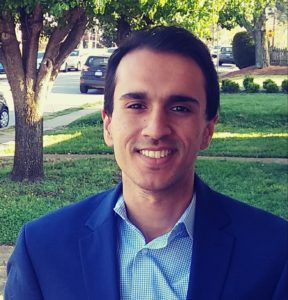
Adil Yaqoob, Vanderbilt University Law School '18
Growing up in a post-9/11 America, I never considered myself a patriot. Patriotism, to me, meant supporting wars of aggression, torture, racially-targeted surveillance, and indefinite detention. It meant cheering on a regime that violated human rights at every turn. Frankly, I didn’t even consider myself to be completely American, even though I am an American citizen, because of what was being done in the name of the American flag. But after taking a U.S. history course in high school, I realized that some of the most prominent and adored figures in American history were the ones who opposed the government when it engaged in authoritarian and rights-violating acts. Standing up for the rights of reviled minorities during times of distress was as American as apple pie. I realized that true patriotism isn’t supporting your government always and no matter what; true patriotism is defending the principles that make your country unique.
After interning with the ACLU before law school, interning with the Civil Rights Division at the Department of Justice as a law student, and being involved with ACS throughout law school, I realized that the Constitution and the individuals who have agitated for the realization of various constitutional rights are what make this country great. My feelings of patriotism increased after every ACS event I attended. These events made me realize that American values are progressive values; that there isn’t a contradiction in being a believer of equality and diversity and being a patriot; and that the Constitution is at its heart, a document that is deeply concerned with protecting the rights of minorities. After all of this, I proudly and unabashedly consider myself to be a patriotic American.
4/16 Students of ACS
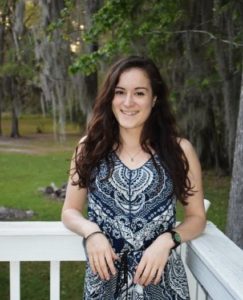
Kathleen Taylor, Mercer University Walter F. George School of Law '18
Growing up in Coastal Georgia, a generally very conservative and Christian place, being a patriot and supporting your country meant certain things. Being a good American and a good Christian were inexorably tied together. To be a patriot, you had to love God and America. At school, patriotism meant standing up during the national anthem and pledge of allegiance, saying the Lord’s prayer, and writing Bible verses on cards to deployed soldiers. My mom and dad were both US Army officers who reinforced the importance of having respect for the Constitution, the flag, the president, and the military. I had never heard of a Patriot looking like anything other than the adults around me at church, school, and at home. I never doubted that I was a patriot simply because no one had ever implied that I was not.
There’s a prevailing idea among conservatives that their ideas on law and policy grant them a monopoly on patriotism—on American values. Think of the recent revival of the phrase “America First.” It’s obvious that the meaning is that there is a group within America that does not believe in putting America’s interests first. There is a false belief that to be on the other side of “America First-ers” is to be anti-American or unpatriotic. This idea is false and harmful, as a hallmark of progressivism is the belief that what makes America great is diversity. You can be anyone in this country and the law is supposed to afford you equity and justice. America was the pathfinder for those principles in the modern era. Accepting and showing respect for diversity is an essential component of being a patriot; of loving America and advocating for its interests.
Yes, our country has problems. Yes, it’s our responsibility to notice its problems. And emphatically yes, it is our duty to fight and advocate for solutions to those problems, so that we can fulfill our Constitutional ideals. We have to be the change we want to see. Although our beliefs about which policies are in America’s best interest differ, at the end of the day, progressives and conservatives have the same motivation for advocacy: to improve the country that we love. As patriots, rather than saying “Make America Great Again” and “America First,” let’s acknowledge that because we believe America is great, we have the power to make it better.
4/9 Students of ACS
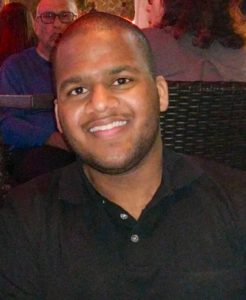
Shane Grannum, Columbia Law School '18
There is no greater challenge our generation must confront than the threats facing our nation's democracy. We cannot combat climate change, make gun safety a priority, pursue criminal justice reform, and dismantle the structural inequalities that disproportionately affect people of color without first ensuring that every eligible U.S. citizen has the unfettered right to vote for the elected officials of their choice - without impediments or interference, without fear of intimidation or suppression, and without the undue influence of money in politics. It is for that very reason that I decided to pursue a legal career and join the American Constitution Society.
To me, being a progressive means being a fearless advocate for oneself and others; empowering the marginalized and underserved; and empathizing with the daily challenges and struggles others face. We are stronger as a nation and as a people when we open our arms and embrace others with experiences much different from ours - not as talkers but as listeners.
ACS has fostered that environment, both inside and outside the walls of law school. We critically think about contentious issues with integrity and respect. We don't let barriers and obstacles hold us back from pursuing change; we simply trudge forward and find another path. After three years of law school, I am all the more stronger because of the grounding ACS gave me. I am all the more wiser because of the ACS members I've met and befriended, from classmates to peers at institutions across the country. And I am all the more ready to fight to protect voting rights, reform our campaign finance system, and elect officeholders who will safeguard our democratic institutions for years to come.
4/2 Students of ACS
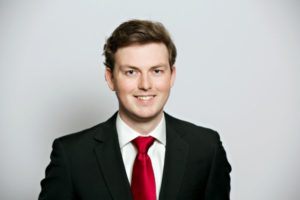
Seth Zawila, University of Minnesota Law School '18
I went to law school to make a difference. Growing up, I believed that lawyers were the guardians for a society that protected that rule of law and fought for those without a voice. My life experiences have certainly shown me that reality is more complex, but I’ve still held onto that basic premise as I've entered into the professional role of a lawyer: that the law should be a tool for all Americans, not just for those with wealth and access.
Working as an ACS Chapter President has allowed me to live this belief to the fullest. I have been able to highlight social injustices that can be fixed by the legal process and actually do something about fixing them. I’ve had the incredible honor of watching our chapter grow from three board members to twenty-five and go from hosting no events to hosting U.S. Senators and Vice-Presidents. The drive to make a difference is what has pushed me and, while it has not been easy, it happened through hard work and embracing the work we do as ACS.
It happened by hosting forums with policymakers and intellectual leaders – asking pointed questions and demanding attention to these issues. It happened by creating a community where bright and passionate people can come together to talk about change. And finally, it happened - most importantly - by empowering others to get involved and fight for the causes that they believe in.
3/26 Students of ACS
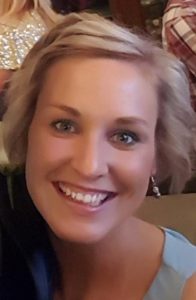
Naomi Martin, Sturm College of Law '20
"If you are neutral in situations of injustice, you have chosen the side of the oppressor." This quote by Desmond Tutu is so important in how we make choices in our lives everyday, and is especially relevant to where our country stands right now. I remember reading this quote for the first time when I was considering pursuing a career in law. While weighing this decision, this quote stuck with me. It helped me to realize that I could not stand by as a neutral observer, but needed to get involved in the fight to protect ALL people's constitutional rights.
While finishing up my junior year of undergrad, I was awarded legal guardianship of my older sister. Guardianship was necessary because of the challenges that came with severe mental illness, and the county and state falling short in providing my sister with her individual rights and appropriate level of care. In this situation, I was able to advocate on her behalf and make sure she was given the level of respect and dignity all individuals deserve, regardless of their mental health challenges. It became so apparent that people who shared these same challenges, but did not have someone to advocate for them, would be brushed to the side and swallowed up by the system. This experience has given me a unique perspective on our legal and social services systems, and furthered my dedication to pursuing a career as an attorney.
Being in my first year of law school and taking Constitutional Law, I more clearly understand and appreciate the protections provided to us by our Constitution. These rights, however, are not applied equally to everyone in the United States. I was fortunate to get involved with the American Constitution Society right away and know that my involvement has helped me to remember why I chose to attend law school. Our DU student chapter of ACS was reconstituted this year and I am so excited to see where we can take it. It is such an inspiration to be a part of an organization that never chooses to be neutral in situations of oppression.
3/19 Students of ACS
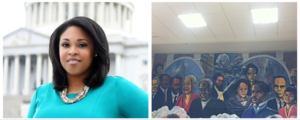
Ashley J. Lawrence, Howard University School of Law ’18
In pursuing a career in public interest, I am constantly reminded of my favorite quote: “Make a career of humanity. Commit yourself to the noble struggle for equal rights. You will make a better person of yourself, a greater nation of your country, and a finer world to live in” which Dr. Martin Luther King, Jr. spoke during the Youth March for Integrated Schools in 1959. For me, the journey through law school has been an arduous one, filled with many tears, stress, and bouts of sickness. My membership within ACS and my decision to attend Howard University School of Law have been sources of strength during my lowest moments.
Sometimes when I have been overwhelmed by the pressures of law school, I walked through Houston Hall and looked at the class murals–from the first graduating class of 1871 to present day–to receive encouragement. Attending law school in the heart of Washington, D.C. has allowed me to have some amazing opportunities outside of the classroom that have nourished my interests in public interest, civil rights and social justice issues. I am committed to social justice, which has been fortified by extensive training in social justice lawyering through civil rights internships with the Lawyers Committee for Civil Rights under Law, the Advancement Project and the NAACP Legal Defense Fund. These organizations are instrumental in leading the fight in social justice with impactful work in the public policy and legal fields. The ideals of ACS directly aligns with the work that I went to Howard Law to do and it is an honor to remain a part of this organization during the next chapter of my legal career as a Next Generation Leader.
Last year, ACS served as a place of solace and community. In our chapter meetings, events, and conventions, I was able to meet like-minded individuals who were committed to the same goals of becoming an advocate and one day enforcing legal protections against discrimination, and safeguarding the civil rights of the disadvantaged. Two experiences that stand out are having lunch with ACS Board of Advisors member Ted Shaw during the Student Convention, who imparted words of wisdom regarding working in the civil rights field. The second experience was the opportunity to participate in Constitution in the Classroom where I taught a Civics class on the First Amendment at Dunbar High School in Washington, D.C. which turned out to be very rewarding. Although I was in finals, it was a great study break — I encouraged students to be interested in the Constitution and inspired them as a future lawyer that looked just like them. My personal background and experiences have shaped my commitment to social justice and public interest work. Growing up in my community of Southeast Queens, New York, there was a microcosm of social and criminal injustice, systemic poverty, unemployment, unequal education, lack of voting rights, and urban and infrastructure issues. So being able to teach high school students about their First Amendment rights was enriching and fun even.
3/12 Students of ACS
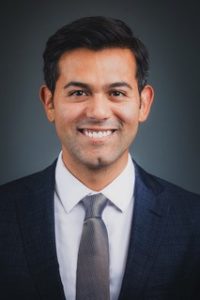
Daniel Galindo, UC Hastings College of the Law '18
"With liberty and justice for all." We were all taught to stand up, cross our hearts, and recite these words in grade school. Growing up in Texas, I even recited them in Spanish over the intercom at the start of the day for the students for whom, like me, English was their second language. But do they have real meaning in "the land of the free?” The answer to that question is why I think ACS is such an important organization.
Before coming to law school, I spent five years working at the ACLU. Most of what I knew about the law and the Constitution I learned by observing some of the best attorneys secure rights for immigrants, women, LGBT people, racial minorities, the outspoken, and religious minorities. I formed an impression that the law was one of the few things that was objectively true, just, honorable, and pure because at the end of the day, justice was usually served. However, when I started to learn the law by reading cases, it did not take long for me to see just how far from the truth that was. It became evident to me that the exercise of interpreting and applying the law is fallible and malleable to the interests of those in power. Our Constitutional history evidences it. When one studies decisions like Dred Scott and the politics surrounding the ratification of the Fourteenth Amendment and its subsequent interpretation, the worth of words like "all men are created equal" in the Declaration of Independence melts away to reveal an uncomfortable truth. The "Founding Fathers" envisioned life, liberty, and happiness for other mostly Christian, straight, white men. In the words of one of my favorite Justices, Justice Thurgood Marshall, "the government they devised was defective from the start, requiring several amendments, a civil war, and momentous social transformation to attain the system of constitutional government, and its respect for the individual freedoms and human rights, we hold as fundamental today.”
It is only because of the arduous process alluded to by Justice Marshall that a gay, secular, man and son of immigrants who grew up poor like me can aspire to shape law and policy. Not too long ago, American citizens of Mexican decent were prohibited from speaking Spanish, forced to attend segregated schools, and even deported. Even the right to marry is one which only five years ago I could not meaningfully enjoy. And still not everyone enjoys equality under the law. The over-incarceration and policing of African Americans and Latinos, the vast disparities in economic and educational opportunities, the lack of due process afforded to immigrants, the vast numbers of homeless people, and our inhumane treatment of asylum seekers, people will mental illness, and people suffering from drug addiction warp and tarnish the values for which we supposedly stand.
"We the People" get the government we deserve. And so we must cultivate and make space for the next generation of progressive voices we want to be interpreting our government’s guiding document. As much as some may want to believe that a document drafted 230 years ago is set in stone, even they are rushing to give it meaning in contexts that the "Founding Fathers" could have never imagined. ACS is an organization breathing real life into the otherwise hollow promises made to all persons by our Constitution through its tireless advocacy, debate, and network building. I am proud to be an ACS member and to contribute to making the Constitution live up to its promise of liberty, equality, freedom, and justice for all.
3/5 Students of ACS
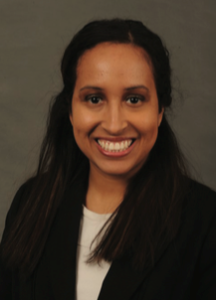
Taylre Janak, University of Notre Dame Law School '18
I have always been aware of two of my overriding beliefs as to law in society: my self-identifying designation as a biracial woman and my desire to access the legal profession to affect change in society. As a biracial female, I have viewed the world through a unique lens of a myriad of perspectives from which one can examine and grapple with the intent and impact of the law. From my specific vantage point, I have observed that while issues of race are not intended to influence the law, they do impact the law. Growing up, it was my intention to use my law school diploma to affect change in my community. To that end, I am committed in my legal career to be a caring and socially active attorney who understands that the inner workings of the law are not always black and white; there are shades of grey in almost every situation.
Throughout law school, I have had diverse experiences from working a semester in the U.S. Trustee’s Office in Washington, D.C. to working as a certified legal intern with the juvenile justice center in St. Joseph County. Attending ACS student conventions as well as the National Convention has inspired me to seek opportunities across both ends of the economic and social spectrum. Further, ACS has provided me a vehicle with which to invite progressive thinkers and thought provokers to Notre Dame. I alongside my classmates have had the pleasure to hear from speakers who address a range of issues from gun control to voting rights to fair housing. Without ACS, my law school experience would have been devoid of an outlet to explore and express progressive ideas and viewpoints in society and my practice of law.
2/26 Students of ACS
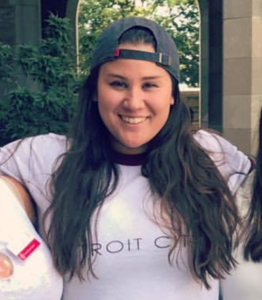
Rachael Hancock, Cornell University Law School '18
I moved to Washington, DC after graduating from college. I wanted to go to law school but I didn’t know where or when. One of the first job applications I sent in was to ACS. Over the next two years I served as an intern, personal assistant, and office manager at ACS. I loved it. My ACS coworkers became my closest friends. I traveled to LA; I competed in office baking competitions; I went bowling in the White House; and I learned what to expect from law school and how to network.
When it was time to go to law school, I had already met a few 3Ls at Cornell through ACS and they immediately recruited me to be a 1L representative of our school’s chapter. As a 2L, I served as the President of our chapter and had an incredible time planning voter registration drives, debate watch parties, and community discussions in Ithaca.
Last January, our chapter individually mailed pieces of a floor puzzle of the Constitution to the White House. Each of the 200 pieces was signed by a member of our community and contained a message asking the President to respect all pieces of our Constitution. Though we never received a response, we felt that the success of this event was in reminding our peers that their voices still mattered and that there is power in community.
ACS has been such a large part of my life and success so far, and I hope to keep it with me as I graduate, become a lawyer, and start my career!
2/19 Students of ACS
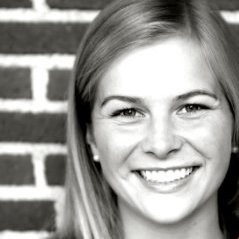
Olivia Hudnut, University of Southern California Gould School of Law '18
As a Los Angeles native, I grew up surrounded by people from diverse backgrounds. Starting in middle school, I studied Korean and Spanish and traveled internationally, developing an appreciation for the uniqueness of the Angeleno culture in which I was raised. However, it wasn’t until the summer of my first year of law school that I began to comprehend how diverse the legal needs of my community could be. I spent my first summer interfacing with litigants in holistic legal aid clinics. I realized that the desperate poverty and modern slavery that I saw when I was living in Hong Kong and traveling in Southeast Asia was closer to home that I could have ever imagined.
Working in legal aid has allowed me to focus my attention on the margins of society. Partnering with the American Constitution Society has provided me with an outlet to educate, organize and engage with my law school peers. To me, ACS has always represented a safe space on campus to envision how we can collectively and progressively shape law and policy to be a positive force in the lives of all people. ACS students and lawyers convene to share ideas, debate policy, and have open and creative discussions. I cannot count the number of issues I have been woken up to and engaged with by ACS lawyers and students (whether at our RBG book club meetings or at the ACS Student Convention).
Through ACS, I developed my passion and commitment to labor and human rights law. As a Peggy Browning Fellow, I worked at the Wage Justice Center recovering lost wages through labor commissioner judgment enforcement on behalf of low-income workers living in Los Angeles. I loved working for a non-profit where there were no restrictions on the people we could reach. I have taken from these experiences a lifelong commitment to social and economic justice and progressive policy reform. I look forward to working in law and policy on the international and domestic arena after I graduate this May.
2/12 Students of ACS
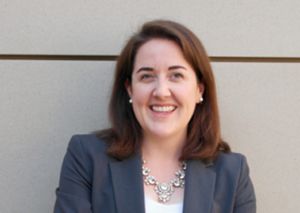
Allison Hunn, UC Berkeley School of Law '18
Before coming to law school, I had the privilege of working in both politics and government. During that time, I developed a love of policy – the ability to solve problems and make lives better through compromise, creativity, and pragmatism. I entered law school with enough work experience to know that I wanted to graduate and begin a policy-centered career. And despite attending a law school with a strong commitment to public service, I didn’t anticipate the pressure I would feel to follow the traditional path of law firms, clerkships - the whole nine yards.
However, with my initial goal in mind, I went to work on the Clinton Campaign in Brooklyn, NY the summer after my first year. I ended up staying through the November Election as part of a field placement, and sadly, felt her loss alongside the many who share a belief in progressive values and fidelity to the Constitution. When I returned to law school in January 2017, I felt unsure about how to remain motivated in this field. ACS helped answer that question.
This year, as President of the Berkeley Law Chapter, I’ve had the privilege of helping arrange speakers and lawyers who are using their talents to add to the progressive discourse. My goal has been, in part, to expose our community of students to the many valuable and important ways we can use our degrees, as well as educate law students on the policy issues being discussed by the legal community. Recognizing ACS’s extensive network of passionate progressive lawyers has helped motivate my final semesters in law school. I’m excited to graduate this spring, and join in the work to solve our country’s greatest challenges.
2/5 Students of ACS
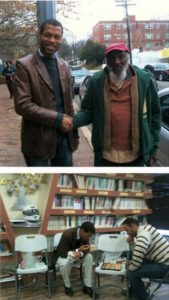
Taru Taylor, Case Western Reserve University School of Law '18
During a lunch break in winter 2011, I was playing chess against one of my students in Jerusalem. Rather than wondering who won, the right question is, “who lost more slowly?”
I used that line recently. I was playing chess near my school when somebody asked, “Who’s winning?” I responded, “The real question is who’s losing more slowly?”
I stole that line from The Wire—"No one wins. One side just loses more slowly.” These are words to live by in this adversarial profession of ours. “Equal justice under law” means that the little guys should lose just as slowly as the big shots do. But the big shots usually lose slower than the little guys because the big shots can afford the slowest-losing advocates that money can buy.
These words also demonstrate Socratic wisdom—that we are all know-nothings. It also shows that we’re all losers. That nobody really wins anything, not even a football game. What about this JD? Won’t that make us all winners? Not likely. But it will make some of us slower losers than we were before. For me, it’ll allow me to help the little guys lose a little bit more slowly in the courtroom.
1/29 Students of ACS
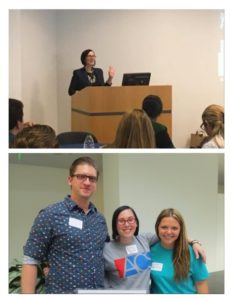
Emily Deyring, Seton Hall University School of Law '20
Timing is everything. What an amazing time for us to be in law school, and what an amazing time to be involved in ACS!
As one of few students at my school who are mothers, I’m proud of the experiences that inform my studies. In my former career as a journalist and copy editor, I was able to engage my love of language, and to help inform the public. I learned the importance of paying attention to detail, and of making voices heard. Now more than ever, the access to accurate information is crucial. Today is a wonderful day to fight for that access, and to fight for equal justice, as a lawyer.
My two children and spouse stood by my side through my former career, and I’m lucky they continue to cheer for me now that it’s time to begin my second career.
Leaving journalism has been a rollercoaster of emotion at times, as I imagine law school is for most students. I still don’t have it all figured out – not by a long shot. But I’m here to learn, from my classmates, my colleagues, my professors, and from my family. I’m here to serve during this precarious time, as a parent, a friend, a partner, and an advocate. I believe in policies that improve the lives of everyone. I believe in us – I believe our profession is a force for positive change.
I was excited when looking for a “home” student organization, a few of my professors suggested I work to revive our ACS chapter. I’m beyond grateful to have found students and professionals who embrace the values that light my path. Our future is bright, and our time to change the world is now!
1/22 Students of ACS
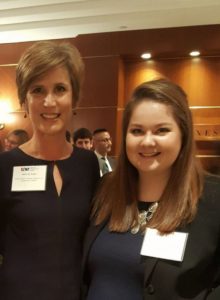
Shelby McKenzie, Georgia State University College of Law '19
Once, I jokingly told my career advisor, “I may not always be the most qualified candidate, but I’m always the most persistent.” This is probably true of my networking endeavors. Unlike other students, I didn’t have any connections to take advantage of when I started law school. Networking was going to be a challenge for me. Which is why being President of the Georgia State ACS chapter has also been an invaluable part of my personal and career development.
I had always wanted to witness family law from the perspective of a judge, but didn’t know many people in the courthouse. When I read an article about the new judge on the family law bench in Atlanta, my first thought was that it would be great to work for her. My second thought was that she would make a perfect speaker for an upcoming GSU ACS event about diversity in the judiciary. I reached out to her staff attorney and she accepted an offer to speak at the ACS Southeast Regional Convening (SERC) at GSU. As she was leaving the panel, she noted her office was always looking for good interns and to send my resume her way. When I saw her at another event a couple weeks later, she remembered me from ACS SERC and we discussed interning with her office. I’ve been interning with her for about 4 months and she is an incredible, progressive woman who deeply cares about Georgia families and judicial integrity.
The ACS Georgia Lawyer Chapter has been invaluable in my networking efforts as well. At their Public Interest Happy Hour, one of the Georgia Lawyer Chapter executive board members running the event introduced me to all the family law attorneys in attendance. As a result, I had several lunches and coffees lined up with prominent Atlanta family law attorneys in the following weeks. And, I even had the opportunity to meet the inspiring Sally Yates at an ACS event!
1/16 Students of ACS
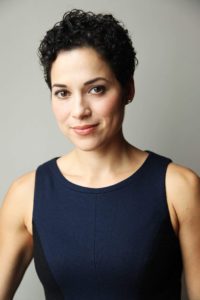
Michelle Herd, Samford University Cumberland School of Law '19
I knew law school was going to be difficult. As a mother to a toddler, I also knew that I could get through it. When I see my son wake up in the morning, I see the future in his face. I see that the work I do today will have an exponential impact. This reality only became clear to me after I had him. Only then did I realize the sacrifices that my own mother made so that I could have a better life. My mother left her home in Central America with two sons of her own to start a new life in the U.S. She did not speak English, she had nothing, not even a high school diploma. Yet, she persevered and never looked back. Growing up, I compared our home life and culture to others and wondered why we were different. Now, I realize what she gave up and how strong and resilient she made us. I realize that we can be more than we imagine we are capable of. Now as I make sacrifices for my son, I think of all the other parents that wake up each morning with the same determination. It makes my load seem lighter and brings me joy.
12/18 Students of ACS
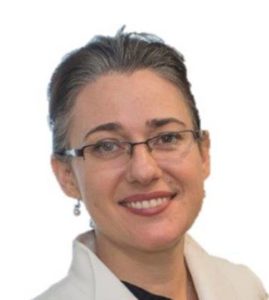
Carrie Hill, The University of Akron School of Law '19
I came to law school as a first-generation non-traditional student for one reason: to re-ignite my passion for public policy. I had two problems right from the get go. I'm not originally from Ohio (so my policy connections were, well, . . . none) and the first year of law school was sucking all of my time just to survive!
ACS helped fill this void – it gave me access to countless like-minded professionals and organizations. Through its scholarships, conferences, and networking, I'm connected! This connection has restored a confidence in me to become more involved in my community and the nation. I see and feel again how each person can make a difference in the world. I’m thankful for ACS’s existence, and for their prioritizing student leadership development . . . its working! Since joining ACS: I’ve Marched on Washington, Researched State Policies effects on sick Ohioans, Served as a Poll Worker, Volunteered at Legal Aid—Ran for Office (student chapter president), Contacted my State Representatives and a certain U.S. Senator (countless times), Studied Policy Internationally . . . and I am just getting started!
My two problems now are narrowing down my options to pick one place to intern next summer and finalizing our student chapter programming next semester. These are good problems to have. Thank you ACS for becoming my home away from home and empowering me to fulfill my public policy goals!
12/11 Students of ACS
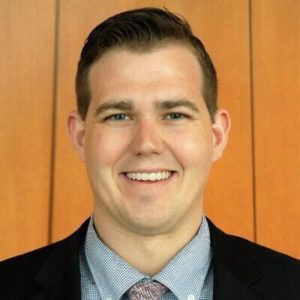
Patrick Stickney, Penn State Law '18
Law school was a culture change. Prior to law school, I was a campaign manager for state and local races and an issue organizer, particularly working on higher education accessibility and affordability. Higher education is a deeply personal concern for me, because I come from a low-income family that experienced domestic violence and drug abuse. Even though it is a pathway to opportunity, law school required me to adjust—to a greater extent than when I attended college—because my family and class background were different than most other law students. Additionally, transitioning from knocking on doors and phone-banking to returning to the classroom was its own process.
I initially did not have an outlet in law school for my fierce devotion to public service to end power disparities within marginalized communities. Having researched the student organizations available at Penn State Law, I was disappointed to learn its ACS chapter was no longer active. However, I put my organizing experience to use and brought students together to restart the chapter.
Through ACS, I met law students and legal professionals from across the country who shared my values. I brought speakers to campus for events on issues such as environmental justice, reproductive rights, and voting rights. While law school had its adjustments, it has allowed me to do things that were unimaginable to me when I was growing up, such as researching and writing amicus briefs submitted to the US Supreme Court or helping to draft legislation for the Pennsylvania House Democratic Caucus.
12/4 Students of ACS
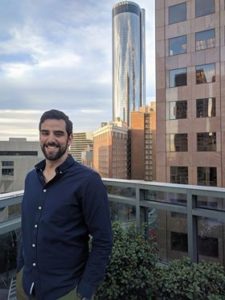
Javier Trejo, Georgia State University College of Law '19
Being a progressive in the deep South is not always easy, but it teaches you how to listen. You get to be pretty good at holding your own in lunchroom debates and at Thanksgiving dinner. You begin to understand the other side and even respect some of their views despite disagreeing with them. It also provides a front row view of the negative impact of conservative legal, economic, and social policy. For example, access to lifesaving Medicaid for rural and urban poor, which were previously considered non-controversial.
Being a progressive in the deep South is not always easy, but I am not alone. ACS has empowered me and, more importantly, allowed me to help empower others. In the faces of my peers and fellow student leaders, I see people excited to drive the conversation on campus and in the community. Our events involving panel conversations about reproductive rights, minority representation on the bench, and police brutality are regularly packed to capacity. Among progressive lawyers and activists in Atlanta and elsewhere, I see the values that make America great defended with tenacity on a daily basis.
There is still tremendous work to be done and we as lawyers are called to serve. We are uniquely positioned to advance justice in all corners of society, for all people, regardless of race, religion, economic circumstance, or geography.
Being a progressive in the South is not always easy, but there is nowhere else I would rather be. Let’s get to work.
11/27 Students of ACS
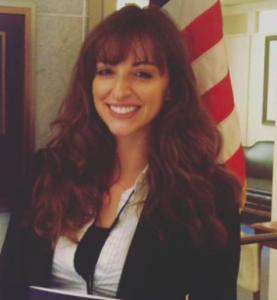
Nikki Levy, Chapter President, The George Washington University Law School '18
It was a big change to move across the country from Las Vegas to D.C. to pursue my JD. 1L year is already hard enough, but having my usual network of support 2500 miles away was difficult. When I got involved with ACS, though, the students, practitioners, and professors became my new network. I found a group of like-minded students on campus who were trying to make a difference. I found professors and professionals who are really interested in helping students succeed. I love having the opportunity to foster important, difficult discussions on our campus. The wonderful staff at ACS National helped foster some of my most valued connections. I tell every law student who will listen about how ACS connected me to two of my internships!
I am eager to fight voter suppression and discriminatory voter disenfranchisement. ACS connected me to my 2L summer internship at the ACLU of Nevada, where I pursued efforts to reduce the discriminatory impact of the state's felon disenfranchisement laws. Next, I was connected through ACS to my current work as a policy fellow at Let America Vote. In this role, I get to fight voter suppression efforts and advocate for laws that increase American’s access to the ballot box. Each day, we see new threats to the voting franchise from across the country. It is frustrating, but I am grateful to be able to use my voice─and my future law degree─to fight back.
11/20 Students of ACS
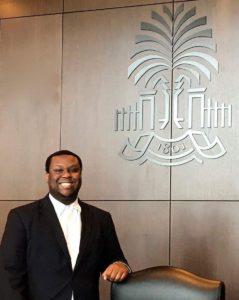
Marcurius Byrd, University of South Carolina School of Law '18
I never really wanted to be a lawyer, even though I was told at a young age I should be a lawyer. I generally preferred math and science classes, which led me to getting a degree in Biochemistry from Washington and Lee University. When I graduated from undergraduate, I had planned to go study medicine as a researcher. I got accepted into a medical school program, but got sick so I had to leave the program. I was basically out of the game of life, trying to figure out what caused me to be sick. It took about four years for me to be well enough to attempt working again. Nevertheless, despite my limited capacity during this period, I kept trying to do what little I could do to stay involved and help others.
Once I was able to, I spent as much time as I could volunteering, doing social justice activism, and getting involved politically, so I could understand how the world worked around me. My political, social justice, and volunteer activities eventually convinced me that I had to become a lawyer so I that I could help navigate how the law affects so much of our everyday life without us noticing. Even if I could no longer be a doctor, I could help create an army of doctors through other means.
Even though I am now in my last year of law school, I remain active in the groups that helped convince me to become a lawyer. I serve as a Co-Vice Chair in the Sierra Club of South Carolina where I have gotten to work with some of the Club’s national leaders and projects, an Executive Committeeman in the South Carolina Democratic Party, and a part of the leadership team of the local Black Lives Matter Chapter that I helped start. I am just as active at the law school. I serve as president of my ACS Student Chapter, as the moot court team manager for our BLSA chapter, and as an officer in our Technology & Law Student Association. I also helped to restart the Health Law Society and am on the South Carolina Journal of International Law & Business.
Sometimes people tell me I do too much, and in many ways, I can agree. When the only thing you can physically do for so long is try, trying becomes the only thing you know how to do. And eventually you end up succeeding and all the failures become the stepping stones to your ultimate successful destination.
11/13 Students of ACS
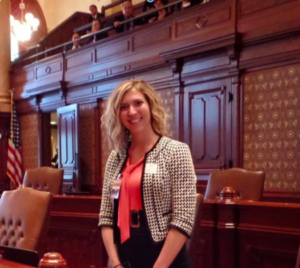
Lari Dierks, Northwestern University Pritzker School of Law '18
Growing up in a small southern Illinois town, everyone looked the same. When I say small town, people often underestimate what I mean. I lived a ten-minute drive from the closest towns in our area, Ava, population 800, and Campbell Hill, population 230. Growing up in such a small town, on my family’s farm, gave me a strong sense of community that I still hold with me today. But, I also recognized the limited view of the world so many people from this area hold.
When I was in high school, I had the opportunity to go on a trip with high school students from Illinois, Kentucky, and Missouri. We met with a group of 20 high school students from New York City and traveled through Europe for a month. This experience opened my eyes to a world and cultures that were not present in my small southern Illinois town where everyone knew each other, and looked alike. Then, while I was in college I found out there was an opportunity to work in Springfield, Illinois as a staff analyst for the House of Representatives. Prior to hearing about this opportunity, I never imagined that someone from my small town could make the law. But, I did and I loved it. I worked on two campaigns electing Democrats to the Illinois House of Representatives and helped draft major legislation. But, eventually I knew I wanted to go to law school and I moved to Chicago to begin my law school career.
Throughout my journey, I have developed a deep passion for protecting constitutional rights. When I entered law school, I learned about ACS and was hooked. I loved the people I met who shared my passion for creating a better world. After President Trump was elected, I knew my place in this fight would be to find a connection between the world I grew up in, and the world I live in now. We can only bridge that gap by supporting important conversations about progressive issues and ACS supports these conversations every day. Together, we can help open the minds of people who have not experienced the diverse United States we know and love. Because of that goal, ACS will always have a special place in my heart.
11/6 Students of ACS
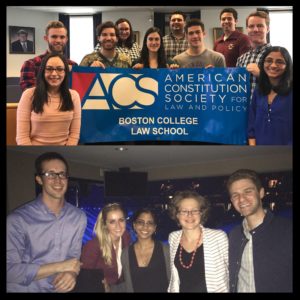
Vaishali Goyal, Boston College Law School '18
I have typically been the only brown student in my classes and often am the only student to actually be excited to be in school and to have the opportunity to learn about things that no one in my household knew about. That passion to learn enabled me to work hard, and become a first generation college and law student. While confident that I worked hard to get to law school, I was suddenly confronted again with being the only brown student on Law Review. I felt completely out of place.
After days of imposter syndrome, I realized—even if they outnumbered me, I was still seen as their equal. But after President Trump was elected, I was not sure anymore. I felt this duty to discuss with my colleagues the structural barriers faced by people of color. After contemplating how to discuss this issue with my classmates, I turned my energy to ACS to host events that would communicate the issue of structural inequality to my Boston College Law School students. Through that, I have connected with people that are fighting for change and spreading this message and the work that needs to be done—especially now.
10/30 Students of ACS
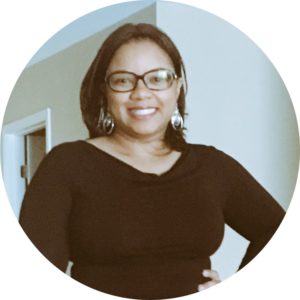
Candice Isaac, West Virginia College of Law '18
Twice in my life, I have heard the words “If I were you, I would pack up my things and leave.” Although in two different contexts, I must admit these words were hurtful. In the first instance, I had gone to the mailbox and received a letter from United States Citizenship and Immigration Services. I was positive it was my approval for a green card, but it was a deportation letter. My journey to become a permanent resident was in jeopardy. I contacted an attorney who said I had no chance of staying and needed to pack up my things and leave. The second time occurred last summer by a recruiter at a top government agency. She stated I was not passionate enough about the law and maybe law school was not the place for me. However, my journey to law school is no farce. My determination to complete this degree will not be deterred by her words. If only she knew, she might have opted to say something nice instead.
Nevertheless, I remain resilient and persistent in my efforts to become educated and grounded in the law. I know that obtaining a legal degree not only reaps benefits to me, but to every extended community I am a part of. ACS drew me in with its mission and vision to serve the needs of all people. My background and experiences are unique. I oftentimes find disheartening a system, which doles out rigid justice without compassion, any concern for decency, and any consideration of contributing factors. To my fellow ACS members, let us continue to lend our voices to spaces and places that restrict the core values the Constitution seeks to protect.
10/23 Students of ACS
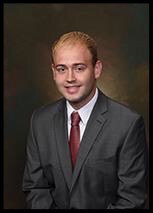
Kevin W. Connell, William & Mary Marshall-Wythe School of Law '18
I entered my first year of college a conservative registered Republican, but departed for law school a progressive registered Democrat. Growing up in a white, middle-class home of two public school teachers, I was taught the basic concept that hard work creates success. In other words, achieving the American Dream was not a question of if, but when. It was a philosophy that I believed in fiercely, and one that shaped my early political ideology and ultimate worldview.
This all changed, however, after working a minimum wage job in food service while I attended college. Shortly after starting, it became apparent that most of my coworkers did not live in the same reality of opportunity. Contrary to the popular opinion of conservatives, these employees are not high school students working a part-time job for extra spending money. They are people who were born into poverty; they are the children of parents where English is a second language; they are members of families lacking any college education; they are single parents who have dropped out of school; and they are Baby Boomers who were laid off late in their careers without a pension. Although my coworkers came from a unique variety of circumstances, they shared a common certainty: hard work had not and would not lead to sharing with me in the same American Dream. Slaves to a system rigged against them, paychecks amounting to half of a living wage leave most of my previous coworkers with no way of getting ahead. It is as if their heads are being held above water high enough to avoid drowning, but low enough to prevent them from swimming ashore. In addition to this common economic struggle, many of these same people face additional challenges relating to their race, gender, religion, sexual orientation, and national origin, adding to the already insurmountable odds.
The American Constitution Society (ACS) serves as a guide to the legal community on how we can improve the conditions for people less fortunate through the law and public policy. With the intention of representing public school districts upon my graduation, I plan to carry on the spirit of ACS from my legal education well into practice.
10/16 Students of ACS
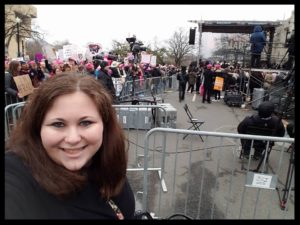
Marissa Ditkowsky, American University Washington College of Law '19
My passion for preserving constitutional rights is based on my personal experience. As a student with physical disabilities that impact my mobility, I constantly advocate to ensure that people with disabilities receive equal protection under the law and the right to due process as guaranteed by the Constitution. In my previous internship, I focused on guardianship. Guardianship proceedings often deny alleged incapacitated individuals of due process, despite the existence of safeguards within statutes, due primarily to paternalism and misunderstanding of capacity and disability. Additionally, guardianship tends to be an overly restrictive option that denies individuals the right to make personal choices and decisions about where to live, who to see, and what to do.
Guardianship provides for just one of many potential barriers for people with disabilities to receive constitutional protections. Poll accessibility and the fundamental right to vote has been a major issue in regard building compliance and ability to get to the polls, which is even more difficult when states continue to close polling locations. Criminal justice system flaws, such as mass incarceration and police brutality, also disparately impact individuals with disabilities, primarily due to ableism, lack of training, and the increased possibility of misunderstandings. Violations of the Fourth, Fifth, and Fourteenth amendments are rampant. A progressive interpretation of the Constitution ensures that minority populations are protected in the same ways as everyone else.
10/9 Students of ACS
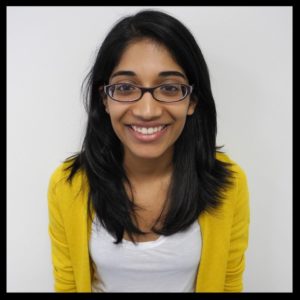
Rosann Mariappuram, The University of Texas School of Law '18
I got involved with the Texas Law chapter of ACS as a 1L. At my first event, I was a timekeeper for an affirmative action debate co-hosted by the Federalist Society. As a woman and a person of color, I was nervous about the direction the conversation might go. But I was so proud to see ACS students and faculty members push the level of discourse towards critical thinking and analysis, rather than circular talking points that ignored the lived experiences of students. As a 2L, I became our chapter's Vice President of Events and got to share my passion for reproductive justice by planning an event featuring Stephanie Toti, the lawyer who argued Whole Woman's Health v. Hellerstedt. In the wake of the 2016 presidential election, our ACS chapter deepened our connections to other student organizations and showed up in solidarity to protest a transphobic speaker who was brought to campus. As I enter my 3L year, I am so honored to be the President of our ACS chapter. We have a great year of events planned and are excited to continue growing our membership!
10/2 Students of ACS
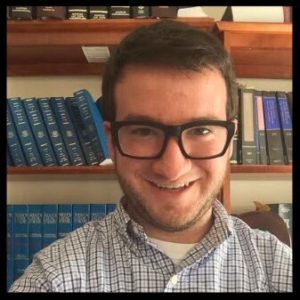
Christopher R. Henderson, Quinnipiac University School of Law `20
I truly believe that the law can be a tool for positive social and economic change. It can, and has, created the conditions leading to better lives for all people.
For instance, the National Labor Relations Act and its equivalent in the states have allowed workers to come together collectively to bargain for better working conditions, better pay, & a voice on the job. It is through these labor laws that the middle class was created and maintained. For me, it has meant a financially secure childhood. My father passed away when I was very young which left our family devastated emotionally and economically. But because of my mother’s membership in a union, we were able to stay afloat during the most difficult time in our lives. She and her union bargained for yearly pay increases, excellent health care, and secure retirement benefits. We were not well off because of the union but we were comfortable and we didn’t have to think twice about going out to eat once in a while, or going to the doctor, or taking a vacation. It was because of the union that a single mother in an industrial town could raise a son without going into abject poverty. Unfortunately, most Americans do not have the privilege of being a part of a union and risk going into poverty thus losing their standing as part of the middle class.
My upbringing inspired me to work for the labor movement and has, in turn, led me into a life of the law. It is my hope that I can utilize the law to push for change to benefit all working people so that they can have security in an otherwise insecure world. My goal as a lawyer is to utilize the laws to create the conditions where opportunity is possible for all, where there is economic and social fairness in our daily interactions in the world, and where all people are treated equally. I hope, as Chapter President at the Quinnipiac School of Law, we can build a network of other progressive lawyers to make that reality possible.
9/25 Students of ACS
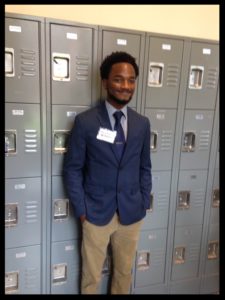
Robert Williams, The University of Mississippi School of Law '18
When you tell someone that you are a law student, you will likely hear: "Whoa, you're in law school! You must be smart!" While it is a great compliment, those reactions are mostly the opposite of what I feel. Coming into law school, I had the support of all my family and friends. As the first person in my circle to go to law school, everyone believed in me. Of course, I wanted to go back and tell them, "I'm doing great in school. I'm going to come out and be the great lawyer you all think I can be. I feel like I belong there."
Your first week, you learn about all your new peers, the ones that have done way more than I have before entering school. Not only did they know lawyers, some knew what to expect, had mentors, higher college GPAs, better LSAT scores, or simply came from a world that wasn’t as black and white as mine.
How could I compare to that? How can I go back to my circle—those that believed in me—to tell them that I’m so very far from being the best. In fact, I may be fighting to be mediocre. I doubted myself and didn't strive for on-campus interviews since I knew the advantages my peers had over me. It was also easy for me to simply accept not getting an A in my classes. I started to question how I even got into law school? Whose spot did I take? Am I just here because I’m black?
I let those thoughts and feelings beat me up for a long time, and honestly, it still does. Law school makes you compare yourself to your peers. Having these thoughts these last two years have been difficult, and it will likely be a lifelong struggle for me. I may not be able to tell my circle that I was the best, or my unique talent stood out. But, I am able to tell them that, no matter what, I did belong.
9/18 Students of ACS

ACS Student Leader, New York
Growing up, I have always been keenly aware that my parents had very different political views, but I was encouraged to be my own person and to follow my own path. However, the current Administration has drastically deepened the schism between my mother and me.
Gradually, she has become increasingly xenophobic and bigoted. I no longer was encouraged to follow my own path and was labeled an "effing liberal" for choosing to speak against her views. Regardless of her graduating from a women's college, my mother had hate in her voice against Hillary Clinton, while championing a man who prides himself on grabbing women.
Through ACS, I am surrounded by people who encourage freedom of thought and speak out against hatred and bigotry. My mother and I may never have a good relationship again, but I chose not to go down a path of bitterness or anger. The Constitution serves as a guide for how to progress as a Nation; while ACS congruently serves as a way for law students and lawyers to achieve the goals of our founding fathers.
9/11 Students of ACS
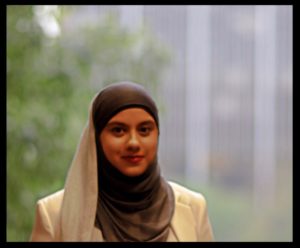
Ayesha Haq, University of Cincinnati College of Law ’19
Before high school started, I had no idea what I wanted to do in life. My father, an over-achiever in all aspects, had unrealistic expectations from me as his first-born child. Irritated by my childish ways, he sat me down one day and asked what career I wanted to pursue. He only gave me three days to give him a final decision. I was infamous for being a troublemaker in the family, and people always found me questioning society, law and politics. Putting this infamous quality to use, I decided I wanted to become a lawyer. I didn’t have much purpose back then and just knew that the law consumed me with a passion indescribable by words.
The lack of purpose slowly changed as I found myself immersed in discussions of terrorism paired with Islamophobia. I was tired of being the only screaming individual defending Muslims in a heated debate which led to no fruition or change in perspective. Suddenly, my purpose as a future lawyer became clearer. I developed a keen interest in advocating for minority rights, which are vested in the Constitution of the United States. Our country has a dark history of alienating, dehumanizing, and criminalizing communities of color. It is unfortunate to see history repeat itself in the name of “national security.” I have high hopes that progressives will shape the way we value citizens and immigrants from different cultures, religions and nationalities. I plan to devote my legal career towards ensuring that people are given the dignities they deserve in the United States of America.
9/5 Students of ACS
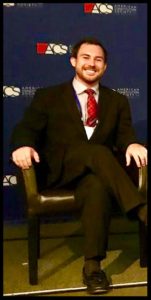
Charles M. Schully, Tulane University Law School '18
Growing up privileged in New Orleans means asking yourself a lot of questions. If you answer them honestly, you will naturally come to the conclusion that there exists an oppressive system of laws and policies that work to harm certain groups of people. I witnessed it again August 29, 2005, the day Katrina made landfall. We lost our home for 13 months, but people with less means lost so much more. Worrying about the people in the Housing Developments and in the Superdome, I felt more powerless to help than I had ever felt in my life.
As a law student and an ACS Chapter President, I continue to witness these injustices, many of which have become increasingly exacerbated in 2017. Only now, I am not the impotent, naive, and frustrated teenager I was in those hazy Post-Katrina days. I confront the oppression of the criminal justice system with the tools and knowhow to fight for victims of the carceral state. I know my rights when I escort patients to one of only three remaining abortion clinics in Louisiana, while distracting them from hearing the leitmotif of taunts by protesters. I have provided legal observation at the celebration and counter-protest that accompanied our city’s courageous decision to remove four confederate monuments.
My education has transformed my stagnant white guilt into action, solidarity, and allyship. I am a student who pledges his work to fighting injustice and oppression, because I dream of a future when all of my fellows may sit together - and share in the bread and roses.
8/28 Students of ACS
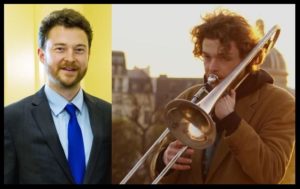
Ryan Snow, The University of Virginia School of Law ’18
I worked as a professional trombonist for ten years between college and law school. I played mostly avant-garde jazz and free improvised music, and also freelanced and taught. I organized and produced a music series in my Brooklyn basement for two years--literally underground music. I co-founded a soul-rock band called Sister Sparrow & The Dirty Birds and we took flight, playing over 500 shows in 45 states and traveling 200,000 miles in three years.
While on the road I began to feel my focus and passion shift. Traveling without moving--sitting in a van all day--I read obsessively about politics and policy. I had always cared deeply about our democracy, and in the aftermath of Citizens United I could see it being weakened. When Shelby County came down I realized it was being taken away. Having had the opportunity to pursue my dreams I felt a moral duty to work toward a society that works for all, and that will require expanding meaningful access to our political system. I left the band, took the LSAT, worked as a field organizer in New Hampshire on the 2014 midterm, and applied to law school. I am devoting my legal career to fighting for voting rights, ending gerrymandering, and reforming the campaign finance system.
8/21 Students of ACS
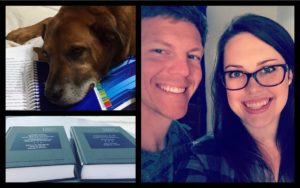
Christina Beeler, University of Houston Law Center ’18
As a first-generation college student, I’ve always struggled with imposter syndrome. On the first day of law school, I cried in the bathroom during my Torts class. I went home that evening and swore that I’d never go back; I felt like I couldn’t compete. It seemed like everyone already knew so much, and I felt like I was already behind on the first day. My husband convinced me to go back the next day. On the car drive to school every morning, I started repeating to myself, “You belong in law school.” Eventually I started to believe it. Now I am in the top 10% of my class and I only have one year of law school left. Some days I still feel like I don’t belong, but I remind myself that first-generation students commonly feel this way and that my feelings don’t have to dictate my choices.
8/14 Students of ACS
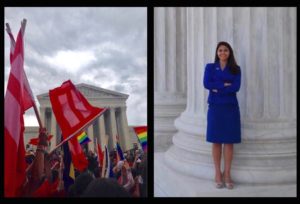
Sophia Carrillo, Stanford Law School ’18
I was inside the Supreme Court during the reading of the Obergefell opinion. As we were leaving the Supreme Court, we were directed by marshals to stay back and exit on the side. The swelling crowd outside had heard the good news and burst into celebration. It was a moment of pure joy.
My first time visiting the Supreme Court, I camped out to hear the oral argument in Arizona v. United States. I grew up on the U.S./Mexico border and the "Show Your Papers" law in Arizona seemed like a clear wrong with a record full of animus towards immigrants and Mexican Americans. Hearing the Justices consider this case made me feel like my community was being heard. Five years later, immigrant communities continue to live in fear with DACA on the chopping block, anti-immigrant rhetoric, and deportations "so fast your head will spin" becoming policy. This constant fear is so prevalent that one of my mother’s kindergarten students recently burst into tears and refused to board a bus headed to the county fair for a field trip—she associated buses with deportation.
The nature of injustice is that we may not always see it in our own times. As soon-to-be lawyers, our charge is to ensure that our country sees, and challenges the nature of injustice now. I joined ACS to ensure the law was a force to improve the lives of all. I am inspired every day by our steps forward and the work remaining to be done.
